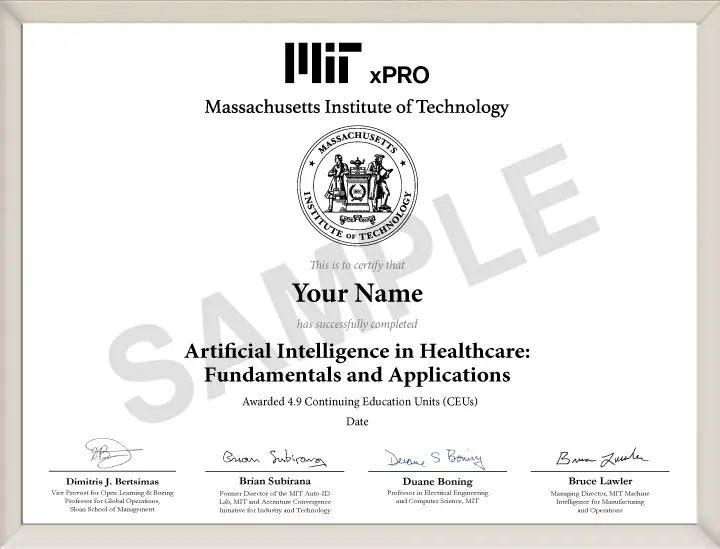
Artificial Intelligence in Healthcare: Fundamentals and Applications
Harness the power of AI to elevate modern-day medical treatments
Program Overview: Artificial Intelligence in Healthcare
The Artificial Intelligence in Healthcare: Fundamentals and Applications program from MIT xPRO is an online learning experience designed for healthcare professionals, technical leaders, and innovators like you seeking to apply AI in healthcare environments.
As AI rapidly transforms the healthcare industry, many professionals face the challenge of translating complex AI concepts into practical, scalable solutions. This program addresses that gap through self-paced modules, expert-led instruction, case studies, and applied projects focused on AI models, machine learning (ML), and real-world healthcare applications. You will gain the knowledge to evaluate AI technologies, deploy AI solutions ethically, and improve patient outcomes across evolving healthcare systems.
Note: The content of this program assumes previous knowledge of calculus, linear algebra, statistics, and probability. Basic Python experience will also be beneficial.
Watch the Progam Preview
Watch the video to learn how this program can help advance your career in healthcare.

Who Is the Artificial Intelligence in Healthcare Program For?
MIT xPRO’s Artificial Intelligence in Healthcare program is ideal for:
Technical professionals in the healthcare industry: Technical product managers, product managers, directors of product, product design managers, engineering managers, technology project managers, directors of engineering, and directors of technology, who are looking to drive the adoption of AI in healthcare at their organizations by adding AI products and services that empower patient care
Entrepreneurs: Innovators and business leaders who are guiding teams and organizations in designing healthcare solutions that harness AI technology to impact millions of lives
Clinical leaders: Senior physicians, department chairs, medical directors, chief medical officers, physician service line directors, nurse leaders, hospital administrators, directors of clinical services, and nursing/medical school deans who are seeking to sharpen their understanding of AI products and methodologies to advance patient care and identify new opportunities emerging in the field
Technology consultants in healthcare: Consultants in hospitals, digital health, pharmaceuticals, med tech, research, and insurance who are responsible for shaping the AI strategies for organizations and are, therefore, looking to upgrade their knowledge about new technologies
A basic understanding of AI, ML, data science, and AI in healthcare is beneficial in order to gain maximum value from this program.
Program Highlights

Explore real-world applications of AI in healthcare simulations, and design an AI decision framework tailored for healthcare delivery and operations

Understand AI concepts and technologies, including ML, deep learning, neural networks, natural language processing (NLP), and biomechatronics

Acquire insights and examples from expert MIT xPRO faculty

Develop your ability to assess real-world challenges, opportunities, and future-focused patient care solutions involving a variety of AI technologies

Earn a certificate and four continuing education units (CEUs) from MIT xPRO upon program completion
Key Takeaways: Artificial Intelligence in Healthcare
The program will help you to:
Build a Foundation
Learn about the AI design process model through its various stages
Understand different machine learning algorithms and how they can be applied in varying scenarios
Examine neural network NLP algorithms and their widespread application
Discover the possibilities and limitations of biomechatronics
Apply Your Skills
Use the four stages of the AI design process model to solve a technical healthcare problem
Run an implementation of a single- and multi-layer perceptron in Python
Develop an idea for an ingestible robot to solve a healthcare problem
Use the Peloton framework, designed by research scientist Brian Subirana, within your specific healthcare domain
Execute
Assess business and technical requirements for AI
Map the AI design process and arrive at a cost model
Resolve a communication problem while using prosthetics
Develop an AI product or service for healthcar
Projects for Applied Learning
The Artificial Intelligence in Healthcare program includes a series of hands-on assignments and a strategic project, equipping you to translate AI theory into real-world applications. Through applied learning, you will build expertise in designing, evaluating, and implementing AI-driven solutions that support healthcare systems and improve patient outcomes.

Ideate an ingestible robot to solve a healthcare challenge
Address communication issues when using prosthetic devices

Define business and technical requirements for AI
Explore the three types of AI cancer

Develop a comprehensive plan for a healthcare AI product using wireless monitoring and anomaly detection, spanning scope, design, and testing strategy
Hear from Past Participants
Why MIT xPRO?
Founded in 1861, the Massachusetts Institute of Technology is committed to generating, disseminating, and preserving knowledge and to working with others to bring this knowledge to bear on the world’s great challenges. MIT is ranked #1 in Forbes’ America's Top Colleges list. MIT is dedicated to providing rigorous academic study, innovative research and scholarship, and a diverse campus community.
MIT’s motto, Mens et manus (“Mind and hand” in Latin), epitomizes the university’s dedication to education focused on practical solutions. Through MIT xPRO — one of the institute's online learning platforms — global executives can access vetted content from world-renowned experts anytime, anywhere. Designed using cutting-edge research in the neuroscience of learning, MIT xPRO programs are application-focused, helping business leaders build their skills on the job and in real time.
What You Will Learn in the Artificial Intelligence in Healthcare Program
MIT xPRO’s Artificial Intelligence in Healthcare program features an expert-led curriculum structured around progressive modules that guide you from foundational AI concepts to real-world deployment of AI in healthcare systems. Through self-paced learning, expert-led sessions, case studies, and applied projects, you will learn to analyze health data, support clinical decision support systems, and apply AI solutions that strengthen healthcare delivery and contribute to improving patient outcomes.
Discover the four stages of designing an AI product. Learn how to identify the desired AI behavior, assess business and technical requirements, measure value, and generate a software development plan. In addition, understand how to identify the long-term advantages of a product and analyze the three types of AI cancer and their impact.
Explore machine learning, and its various algorithms, classifiers, decision trees (along with the advantages of training), and validation and testing sets. Analyze how to easily identify the best algorithms for different applications.
Examine deep learning, neural networks, and their applications in drug discovery and cancer research. Learn to run implementations on convolutions and deep and recurrent neural network algorithms while gaining an understanding of Python and artificial neurons.
Acquire a 360º approach to designing AI solutions with an understanding of superhuman targets, software methodologies, tool development, research, ethical responsibilities, and possible challenges to these applications. Learn about the Committee on the Use of Humans as Experimental Subjects (COUHES) and Institutional Review Board (IRB) approval processes, formulate crowdsourcing data strategies, and understand the extraordinary intelligence used in AI products and services.
Explore how transformer-based models like ChatGPT work, including tokenization, attention, and output generation. Explore real-world applications and limitations of generative AI through case studies, including healthcare scenarios. Identify common AI challenges, including hallucinations and verbosity, learn strategies like retrieval augmentation and personalization to improve model performance, and examine emerging tools, such as BloombergGPT and DALL·E, to understand the future potential and risks of generative AI across industries.
Gain a thorough understanding of how the Peloton framework helped facilitate applications, including modern ingestible robots. Develop your own ideas for ingestible robots to help solve healthcare problems.
Deep dive into advanced prosthetics, proprioception, and exoskeletons. Understand their history, research, development, and current limitations, and learn how communication is crucial for the development of some of them.
Identify the immediate challenges and possibilities in the field of healthcare technologies, including business applications, maintenance challenges, various sources of inspiration, the potentials of electromagnetic waves, and the use of radio frequency identification (RFID) chips. In addition, design and develop an AI product for healthcare.
Case Studies and Research
Identify how to generate realistic-looking images of the heart that can be instrumental for cardiologists in diagnosis and treatment.
Learn about GENCODE — the attempt at creating an encyclopedia of genes and genetic variants.
Discover a useful tool for antibiotic discovery that can aid you in your own drug discovery.
Learn how to use an image-based, deep learning model that can predict breast cancer up to five years in advance.
Learn how to create bionic limbs that emulate the function of natural limbs.
Examine how the instrument, named Emerald, functions and measures sleep stages, gait speed and mobility, human pose estimation, and adherence.
Discover how Bruce Lawler makes great strides in his goal to find the shortest path from data to impact.
Faculty

Managing Director, MIT Machine Intelligence for Manufacturing and Operations (MIMO)
Bruce Lawler is a technology entrepreneur and an executive leader. He has developed several applications across platforms, including mobile, SaaS, AI, and video distribution n...

Former Director of MIT Auto-ID lab, MIT
Brian Subirana has taught at MIT Sloan and the MIT School of Engineering, and he is also on the faculty of Harvard University. His research centers on IoT and AI and focuses o...

Clarence J. Lebel Professor, Electrical Engineering and Computer Science
Duane Boning is affiliated with the MIT Microsystems Technology Laboratories and serves as associate director of machine learning and statistical methods for modeling and cont...

Certificate
Get recognized! Upon successful completion of this program, you receive 4.9 Continuing Education Units (CEUs), a globally recognized measure of professional learning that reflects compliance with international quality standards, and a certificate of completion from MIT xPRO.
This program is graded as a pass or fail; participants must receive 75 percent to pass and obtain the certificate of completion.
After the successful completion of the program, your verified digital certificate will be emailed to you, at no additional cost, in the name you used when registering for the program. All certificate images are for illustrative purposes only and may be subject to change at the discretion of MIT xPRO.
Applied AI in Healthcare: Innovation, Strategy, and Leadership
FAQs
How do I know if this program is right for me?
After reviewing the information on the program landing page, we recommend you submit the short form above to gain access to the program brochure, which includes more in-depth information. If you still have questions on whether this program is a good fit for you, please email learner.success@emeritus.org, and a dedicated program advisor will follow-up with you very shortly.
Are there any prerequisites for this program?
Some programs do have prerequisites, particularly the more technical ones. This information will be noted on the program landing page, as well as in the program brochure. If you are uncertain about program prerequisites and your capabilities, please email us at the ID mentioned above.
Note that, unless otherwise stated on the program web page, all programs are taught in English and proficiency in English is required.
What is the typical class profile?
More than 50 percent of our participants are from outside the United States. Class profiles vary from one cohort to the next, but, generally, our online certificates draw a highly diverse audience in terms of professional experience, industry, and geography — leading to a very rich peer learning and networking experience.
What other dates will this program be offered in the future?
Check back to this program web page or email us to inquire if future program dates or the timeline for future offerings have been confirmed yet.
How much time is required each week?
Each program includes an estimated learner effort per week. This is referenced at the top of the program landing page under the Duration section, as well as in the program brochure, which you can obtain by submitting the short form at the top of this web page.
How will my time be spent?
We have designed this program to fit into your current working life as efficiently as possible. Time will be spent among a variety of activities including:
Engaging with recorded video lectures from faculty
Attending webinars and office hours, as per the specific program schedule
Reading or engaging with examples of core topics
Completing knowledge checks/quizzes and required activities
Engaging in moderated discussion groups with your peers
Completing your final project, if required
The program is designed to be highly interactive while also allowing time for self-reflection and to demonstrate an understanding of the core topics through various active learning exercises. Please email us if you need further clarification on program activities.
What is it like to learn online with the learning collaborator, Emeritus?
More than 300,000 learners across 200 countries have chosen to advance their skills with Emeritus and its educational learning partners. In fact, 90 percent of the respondents of a recent survey across all our programs said that their learning outcomes were met or exceeded.
All the contents of the course would be made available to students at the commencement of the course. However, to ensure the program delivers the desired learning outcomes the students may appoint Emeritus to manage the delivery of the program in a cohort-based manner the cost of which is already included in the overall course fee of the course.
A dedicated program support team is available 24/5 (Monday to Friday) to answer questions about the learning platform, technical issues, or anything else that may affect your learning experience.
How do I interact with other program participants?
Peer learning adds substantially to the overall learning experience and is an important part of the program. You can connect and communicate with other participants through our learning platform.
What is the relationship between Emeritus and MIT xPRO?
Emeritus and MIT xPRO collaborate to create and deliver educational programs. None of these programs are Title IV-eligible.
What are the requirements to earn the certificate?
Each program includes an estimated learner effort per week, so you can gauge what will be required before you enroll. This is referenced at the top of the program landing page under the Duration section, as well as in the program brochure, which you can obtain by submitting the short form at the top of this web page. All programs are designed to fit into your working life.
This program is scored as a pass or no-pass; participants must complete the required activities to pass and obtain the certificate of completion. Some programs include a final project submission or other assignments to obtain passing status. This information will be noted in the program brochure. Please email us if you need further clarification on any specific program requirements.
What type of certificate will I receive?
Upon successful completion of the program, you will receive a smart digital certificate. The smart digital certificate can be shared with friends, family, schools, or potential employers. You can use it on your cover letter, resume, and/or display it on your LinkedIn profile.The digital certificate will be sent approximately two weeks after the program, once grading is complete.
Can I get the hard copy of the certificate?
No, only verified digital certificates will be issued upon successful completion. This allows you to share your credentials on social platforms such as LinkedIn, Facebook, and Twitter.
Do I receive alumni status after completing this program?
No, there is no alumni status granted for this program. In some cases, there are credits that count toward a higher level of certification. This information will be clearly noted in the program brochure.
How long will I have access to the learning materials?
You will have access to the online learning platform and all the videos and program materials for 24 months following the program start date. Access to the learning platform is restricted to registered participants per the terms of agreement.
What equipment or technical requirements are there for this program?
Participants will need the latest version of their preferred browser to access the learning platform. In addition, Microsoft Office and a PDF viewer are required to access documents, spreadsheets, presentations, PDF files, and transcripts.
Do I need to be online to access the program content?
Yes, the learning platform is accessed via the internet, and video content is not available for download. However, you can download files of video transcripts, assignment templates, readings, etc. For maximum flexibility, you can access program content from a desktop, laptop, tablet, or mobile device.
Video lectures must be streamed via the internet, and any livestream webinars and office hours will require an internet connection. However, these sessions are always recorded, so you may view them later.
Can I still register if the registration deadline has passed?
Yes, you can register up until seven days past the published start date of the program without missing any of the core program material or learnings.
What is the program fee, and what forms of payment do you accept?
The program fee is noted at the top of this program web page and usually referenced in the program brochure as well.
Flexible payment options are available (see details below as well as at the top of this program web page next to FEE).
Tuition assistance is available for participants who qualify. Please email learner.success@emeritus.org.
What if I don’t have a credit card? Is there another method of payment accepted?
Yes, you can do the bank remittance in the program currency via wire transfer or debit card. Please contact your program advisor, or email us for details.
I was not able to use the discount code provided. Can you help?
Yes! Please email us with the details of the program you are interested in, and we will assist you.
How can I obtain an invoice for payment?
Please email us your invoicing requirements and the specific program you’re interested in enrolling in.
Is there an option to make flexible payments for this program?
Yes, the flexible payment option allows a participant to pay the program fee in installments. This option is made available on the payment page and should be selected before submitting the payment.
How can I obtain a W9 form?
Please connect with us via email for assistance.
Who will be collecting the payment for the program?
Emeritus collects all program payments, provides learner enrollment and program support, and manages learning platform services.
Are there any restrictions on the types of funding that can be used to pay for the program?
Program fees for Emeritus programs with MIT xPRO may not be paid for with (a) funds from the GI Bill, the Post-9/11 Educational Assistance Act of 2008, or similar types of military education funding benefits or (b) Title IV financial aid funds.
What is the program refund and deferral policy?
For the program refund and deferral policy, please click the link here.
MIT xPRO’s Artificial Intelligence in Healthcare course focuses on the application of artificial intelligence (AI), machine learning (ML), and deep learning to solve real-world challenges in healthcare. It covers AI technologies, clinical decision making, healthcare data, and AI-driven solutions that support patient care and improve patient outcomes.
This artificial intelligence course is suitable for healthcare professionals, IT professionals in healthcare, entrepreneurs, and leaders seeking to integrate AI into clinical workflows, healthcare delivery, and digital health environments.
This program will equip you to understand AI models, machine learning algorithms, neural networks, large language models, natural language processing, data analytics, and clinical decision support. The course also strengthens your ability to apply AI strategies and enhance clinical decision making.
MIT xPRO’s Artificial Intelligence in Healthcare program includes real-world case studies, industry examples, and applied projects that demonstrate how AI is used to solve real-world challenges in healthcare systems and digital medicine.
This MIT xPRO healthcare course is delivered in a self-paced format supported by structured modules, expert instruction, and applied learning to ensure practical knowledge.
This program does not offer a professional certification. Upon successful completion, you receive an MIT xPRO digital certificate that demonstrates your knowledge of AI technology and its applications within the healthcare industry. The MIT xPRO name adds significant credibility and recognition to your professional profile.
MIT xPRO’s Artificial Intelligence in Healthcare program is a eight-week online learning journey (excluding one week of orientation) . The self-paced format allows participants to progress through modules, case studies, and projects while building practical expertise in AI models, clinical workflows, and healthcare delivery without disrupting professional responsibilities.
This certificate program from MIT xPRO strengthens career opportunities for industry leaders, healthcare professionals, and entrepreneurs looking to apply AI strategies and integrate AI into modern healthcare systems.
Didn't find what you were looking for? Write to us at learner.success@emeritus.org or schedule a call with one of our Program Advisors or call us at +1 401 443 9591 (US) / + 44 189 236 2347 (UK) / +65 3129 7174 (SG).
Flexible payment options available.
Starts On
